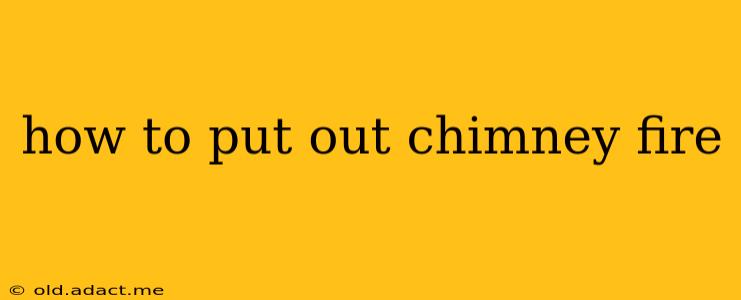A chimney fire is a terrifying experience, but knowing how to react quickly and effectively can significantly reduce the damage and prevent the situation from escalating. This guide provides a comprehensive overview of how to handle a chimney fire, emphasizing safety and outlining the steps you should take. Remember, your safety is paramount. If you are unsure about any aspect of this process, immediately call your local fire department.
What Causes a Chimney Fire?
Before we delve into how to extinguish a chimney fire, understanding the causes is crucial for prevention. Creosote buildup is the primary culprit. Creosote is a highly flammable byproduct of burning wood. Over time, it accumulates on the chimney's interior walls, and if not regularly cleaned, it can ignite. Other contributing factors include:
- Improperly installed or maintained chimneys: Cracks or gaps in the chimney structure can allow embers to escape and ignite nearby materials.
- Burning inappropriate materials: Burning materials like trash, plastics, or excessively damp wood can increase creosote buildup.
- Inadequate ventilation: Insufficient airflow can lead to incomplete combustion and higher creosote formation.
How to Tell if You Have a Chimney Fire
Chimney fires often present subtle signs initially. Recognizing these early indicators is critical for timely intervention:
- Loud crackling or roaring sounds emanating from the chimney: This is a significant warning sign.
- Smoke billowing from the chimney, especially if it's unusually thick or dark: Pay close attention to the color and intensity of the smoke.
- Hot surfaces around the fireplace or chimney: Feel the walls and surrounding areas – excessive heat could indicate a fire.
- A flickering or unusually bright fire in the fireplace: A fire burning hotter or differently than usual could be a sign of a chimney fire.
- Smell of burning wood or smoke inside the house: Even a faint smell should be investigated.
What to Do if You Think You Have a Chimney Fire
Your first and most important step is to call your local fire department. Do not attempt to extinguish a chimney fire yourself unless you are a trained professional with appropriate equipment. However, while waiting for the fire department, these steps can help mitigate the situation:
- Close the damper: This will restrict the airflow to the fire, potentially slowing its spread. However, be cautious; the damper might be extremely hot. Use gloves or a long tool if necessary.
- Open windows and doors: This helps to ventilate the house and prevent smoke buildup.
- Evacuate the house: Get everyone out of the house immediately and move to a safe distance.
How to Prevent Chimney Fires
Prevention is always better than cure. Regular maintenance is key to avoiding chimney fires:
- Annual chimney inspections: Have a certified chimney sweep inspect your chimney annually to remove creosote buildup.
- Regular chimney cleaning: Schedule professional cleaning as needed, which might be more frequently than annually depending on your wood-burning habits.
- Proper wood selection: Use dry, seasoned hardwood; avoid softwoods or treated lumber.
- Maintain proper airflow: Ensure sufficient airflow to the fireplace and chimney.
- Use a chimney cap: A chimney cap can help prevent debris and animals from entering the chimney.
What are the signs of a chimney fire?
(Answering a PAA question)
The signs of a chimney fire can be subtle or dramatic. They include loud crackling or roaring sounds from the chimney, thick or dark smoke billowing from the chimney, hot surfaces around the fireplace or chimney, a flickering or unusually bright fire in the fireplace, and a smell of burning wood or smoke inside the house.
How do you know if a chimney fire is out?
(Answering a PAA question)
You should never assume a chimney fire is out. The fire department will use specialized equipment to ensure the fire is completely extinguished and the chimney is safe. Even after the visible flames appear to be gone, embers may still be smoldering inside the chimney. A professional inspection is recommended after any chimney fire.
How long does a chimney fire last?
(Answering a PAA question)
The duration of a chimney fire is unpredictable. It depends on several factors, including the amount of creosote buildup, the intensity of the fire, and the effectiveness of any measures taken to control it. Some fires might burn themselves out relatively quickly, while others can last for an extended period. Professional intervention is critical to ensure complete extinguishment and minimize risk.
Can a chimney fire spread to the house?
(Answering a PAA question)
Yes, a chimney fire can absolutely spread to the house. The intense heat generated can ignite nearby combustible materials like wood framing, insulation, or even the roof. Therefore, immediate action and professional assistance are crucial to prevent the fire from spreading beyond the chimney.
Remember, safety is paramount. Always prioritize your safety and the safety of others when dealing with a potential chimney fire. If you suspect a chimney fire, call your local fire department immediately. This information is for educational purposes only and does not replace professional advice.
